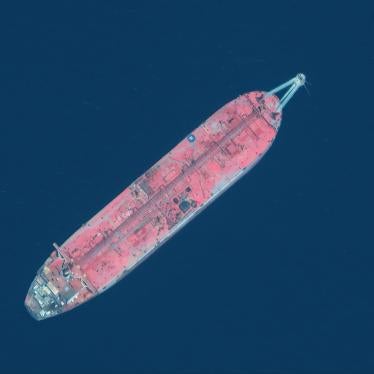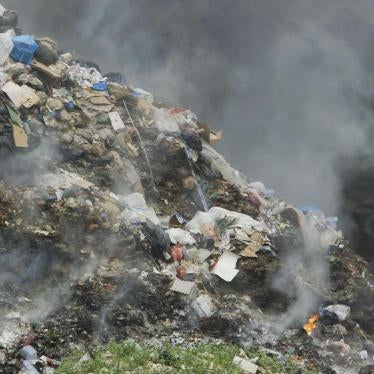(Beirut) – The FSO Safer, an oil storage tanker moored 32 nautical miles from the key Yemeni port city of Hodeida, could explode or rupture at any time, threatening an environmental and humanitarian catastrophe, the United Nations has said. On June 13, 2022, the UN announced that salvage operations could not begin due to insufficient funding and opened a US$20 million crowdfunding campaign to make up the funding gap.
We, the undersigned organizations, urge you, as key donor governments to immediately support the salvage operation that would prevent the supertanker from spilling hundreds of thousands of barrels of oil into the Red Sea. We call upon you to honor your prior funding commitments and increase those commitments as much as is necessary to begin the salvage operation immediately.
The Safer has been stranded without maintenance off Yemen’s coast since 2015 and holds an estimated 1.14 million barrels of light crude oil – four times the amount of oil spilled from the Exxon Valdez and enough to make the Safer the fifth largest oil spill in history. The UN estimated that the cost of cleanup for an oil spill from the Safer would be at least $20 billion, excluding broader economic consequences.
The undersigned organizations commend the prior funding commitments made to the salvage mission while also recognizing that the funding gap remains steep and continues to be a critical impediment to the operation. We are deeply concerned about the lack of urgency and slow pace of donations from the international community that has brought Yemen perilously close to a new humanitarian and environmental disaster.
The UN has warned that the emergency salvage operation will become even more dangerous by October, as high winds and volatile currents increase in the Red Sea.
The Houthi de facto authorities, who control Hodeida, signed a memorandum of understanding with the UN on March 5 agreeing to facilitate a two-stage UN-coordinated plan to prevent a disaster. The transfer of the oil from the Safer to a secure vessel is the first step. This four-month-long operation would cost $80 million – one quarter of which is still needed. The second involves installing a replacement vessel within 18 months. A total of $144 million is required for both stages.
The Yemeni state-run Safer Exploration and Production Operations Company (SEPOC), which owns the Safer, has not been able to maintain the vessel since 2015, causing corrosion. Seawater entered the supertanker’s engine compartment in May 2020, heightening concerns about a possible oil spill or explosion. Before Houthi de facto authorities signed the March agreement with the UN to allow for a salvage plan to be implemented, they had held up UN access to the ship.
We urge immediate action, as every moment the vessel remains neglected leads dangerously closer to an environmental and humanitarian disaster that will drastically exacerbate the already severe humanitarian crisis in Yemen.
We are deeply concerned about the catastrophic long-lasting environmental impacts that could result if the salvage operation does not begin immediately. In July 2020, the UN Environment Programme warned that an oil spill from the vessel could have a “serious, long-lasting environmental impact” on one of the most important repositories of biodiversity on the planet, possibly destroying coastal wetlands, mangroves, seagrass, and coral reefs.
The environmental destruction would have devastating long-term economic consequences for the approximately 28 million people in Yemen, Saudi Arabia, Eritrea, Sudan, Egypt, and Djibouti who rely on these areas for their livelihoods. Given that the Safer is also located close to critical global shipping lanes, there are numerous other likely harmful economic consequences that would result from a spill.
Fossil fuel use is driving the climate crisis, the impact of which risks leading to a series of environmental and human rights harms. These risks are even greater in conflict areas, like Yemen, because of diminished environmental governance and government oversight due to shrinking budgets, access constraints, or other safety and security issues, alongside the possibility of deliberate or accidental attacks on fossil fuel sites.
An oil spill could shut down Hodeida’s port, affecting millions of Yemenis who depend on imports of food and other essential goods. Between 80 and 90 percent of the Yemeni population’s basic needs are delivered by commercial imports and aid, approximately 70 percent of which enter through Hodeida.
We reiterate our concerns that an oil spill of this magnitude would dangerously worsen Yemen’s already dire humanitarian crisis. Thousands of civilians in Yemen have died and been injured since 2015 in the armed conflict between the Saudi and United Arab Emirates-led coalition and the Houthi armed group, which contributed to what the UN called the world’s largest humanitarian crisis.
The undersigned organizations stress that donating $20 million today to end the Safer tanker explosion risk would prevent a disaster that will cost billions in environmental clean-up costs alone.
The undersigned organizations stress that all parties to the conflict must respect human rights and comply with their obligations under international humanitarian law.
Signatories:
- ALQST for Human Rights
- Amnesty International
- Avaaz
- Cairo Institute for Human Rights Studies (CIHRS)
- Campaign Against Arms Trade
- Civil Alliance for Peace
- Conflict and Environment Observatory
- Freedom Forward
- Human Rights Watch
- International Commission of Jurists (ICJ)
- International Crisis Group
- Holm Akhdar
- PAX for Peace
- SAM for Rights and Liberties
- Gulf Centre for Human Rights (GCHR)
- MADRE
- Musaala Organization for Human Rights / منظمة مساءلة لحقوق الانسان
- Mwatana for Human Rights
- Nonviolence International
- Tearfund







